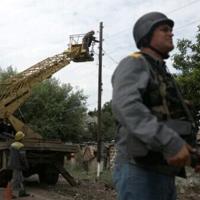Vitaliy Asinenko observed attentively as his colleague sat precariously on a crane, suspended over power cables in a village just a few kilometers from the frontline in eastern Ukraine.
The atmosphere grew tense as a layer of clouds approached them from the horizon, but the 46-year-old electrician had more pressing concerns than a potential storm.
“In such weather, you can’t see the bombs coming,” he remarked, wearing a protective helmet.
For months, Russia has been launching air strikes on Ukraine’s vulnerable energy grid and power plants, resulting in a loss of electricity for millions of people, a move Kyiv has denounced as a clear war crime.
Working alongside his team at Ukrainian energy operator DTEK, Vitaliy has been assigned the task of repairing the damage caused by Moscow’s frequent strikes near Pokrovsk, an eastern city less than 15 kilometers (nine miles) from advancing Russian troops.
“Our priority is to ensure that the civilian refuge point and humanitarian distribution points have access to power,” Vitaliy explained.
Surrounding them were the remains of buildings marred by artillery, a constant reminder that Russia’s soldiers were nearing as they made their way through the eastern Donbas region.
“Three months ago, it was quieter,” Vitaliy recalled.
“Today, the risk of suicide drones has increased, making the situation really dangerous,” he added.
He stated that his team had become a “target” like the military, with some of his colleagues already sustaining injuries in the area.
High above in the basket of their Soviet-era crane, Vitaliy’s colleague swiftly worked to repair a mass of torn copper wire damaged by shrapnel.
In the distance, the sound of explosions echoed.
“Those were rockets,” Vitaliy confirmed from the ground, a hint of unease flickering in his eyes before returning to work.
His team acknowledged feeling fear, but their ability to recognize the sounds of war kept them motivated.
“We listen to the drones and artillery fire, so we understand the severity of the situation,” Vitaliy elaborated.
Their work is ongoing, as bombs continue to fall along the eastern front every day.
– ‘Heroes’ –
Electricity is a crucial resource for soldiers and civilians near the frontline, many of whom are elderly and rely on electricity to maintain basic utilities like running water.
Repair efforts have been complicated by Russia’s use of highly destructive glide bombs, which have become more prevalent over the past three months, as noted by the head of the local village administration, Volodymyr Rudenko.
“The front line is closing in,” the 60-year-old warned, stating that Russia was advancing towards Pokrovsk at a rate of “around 100 meters every day”.
He urged residents to evacuate.
Previously untouched before May, the village’s pre-war population of under 3,000 has dwindled by about half, with only miners and elderly individuals remaining.
In the debris-laden streets nearby, 77-year-old Vira walked around the village with a friend, surveying the damage caused overnight. The electricity in her area had still not been restored.
“I have a small pension, where would I go? What would I do?” she questioned, pulling her scarf tightly around her head.
She revealed that she lived in her cellar out of fear of bombings, tending to a garden where a few cabbages still grew.
Vitaliy, the leader of the electrician team, remained modest about their work.
“We are here for them. Without civilians, we wouldn’t be here,” he emphasized.
The locals refer to them as “heroes”, although the team tries not to linger on-site for too long, despite their experience with explosions.
“Yes, we are brave… or perhaps foolish,” Vitaliy joked, smiling.
Suddenly, a shell whizzed through the air with a shriek, causing the worker in the crane to crouch in their basket due to the force of the blast.
“Let’s get out of here! Come on!” Vitaliy shouted, signaling urgently for his team to leave.
The electricians quickly retreated into their armored vehicle as the crane reversed rapidly to escape.
He mentioned that they would return the next day.
However, their efforts were futile, as the village was left in ruins the following day.
fv/cad/yad





